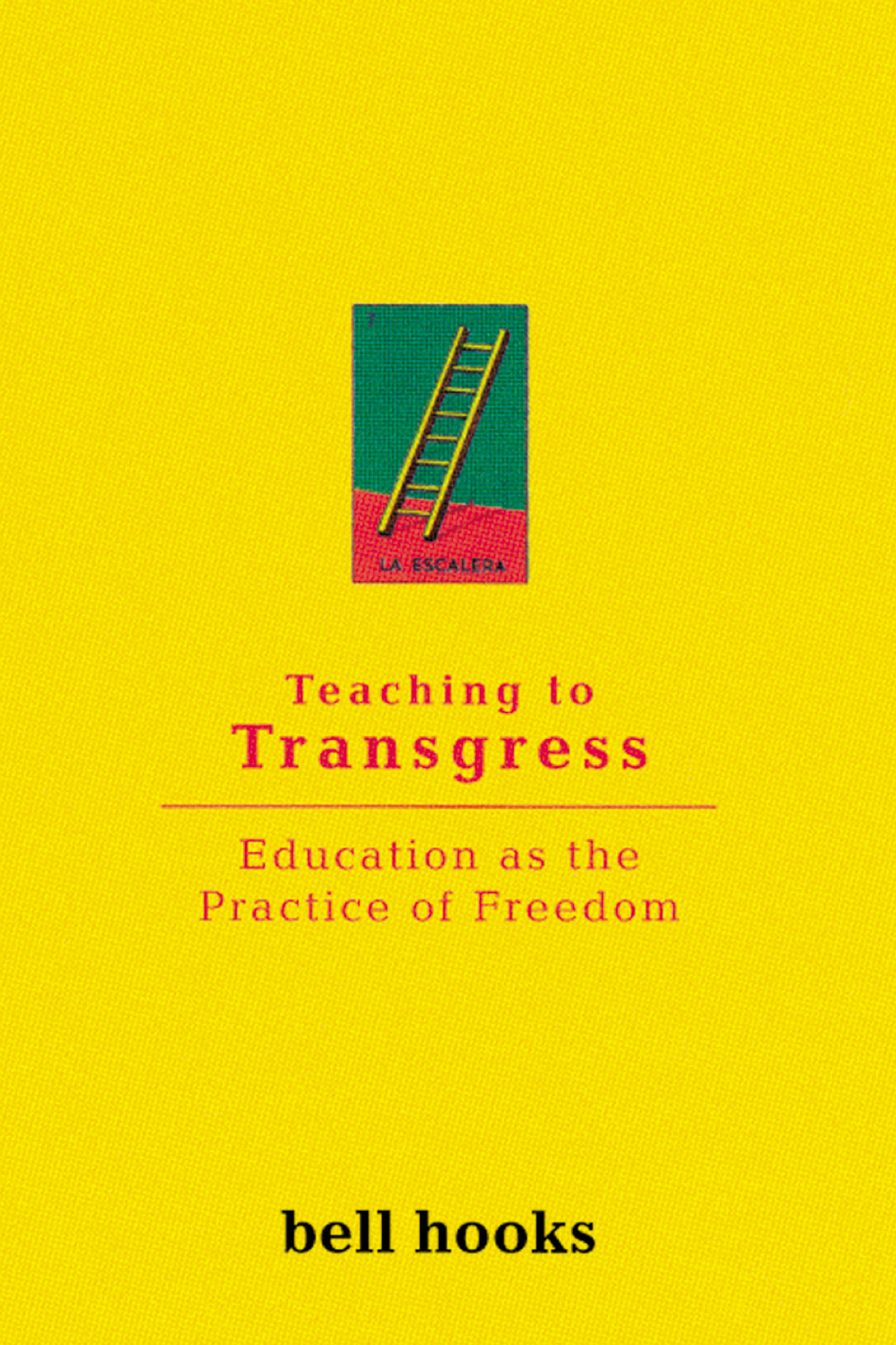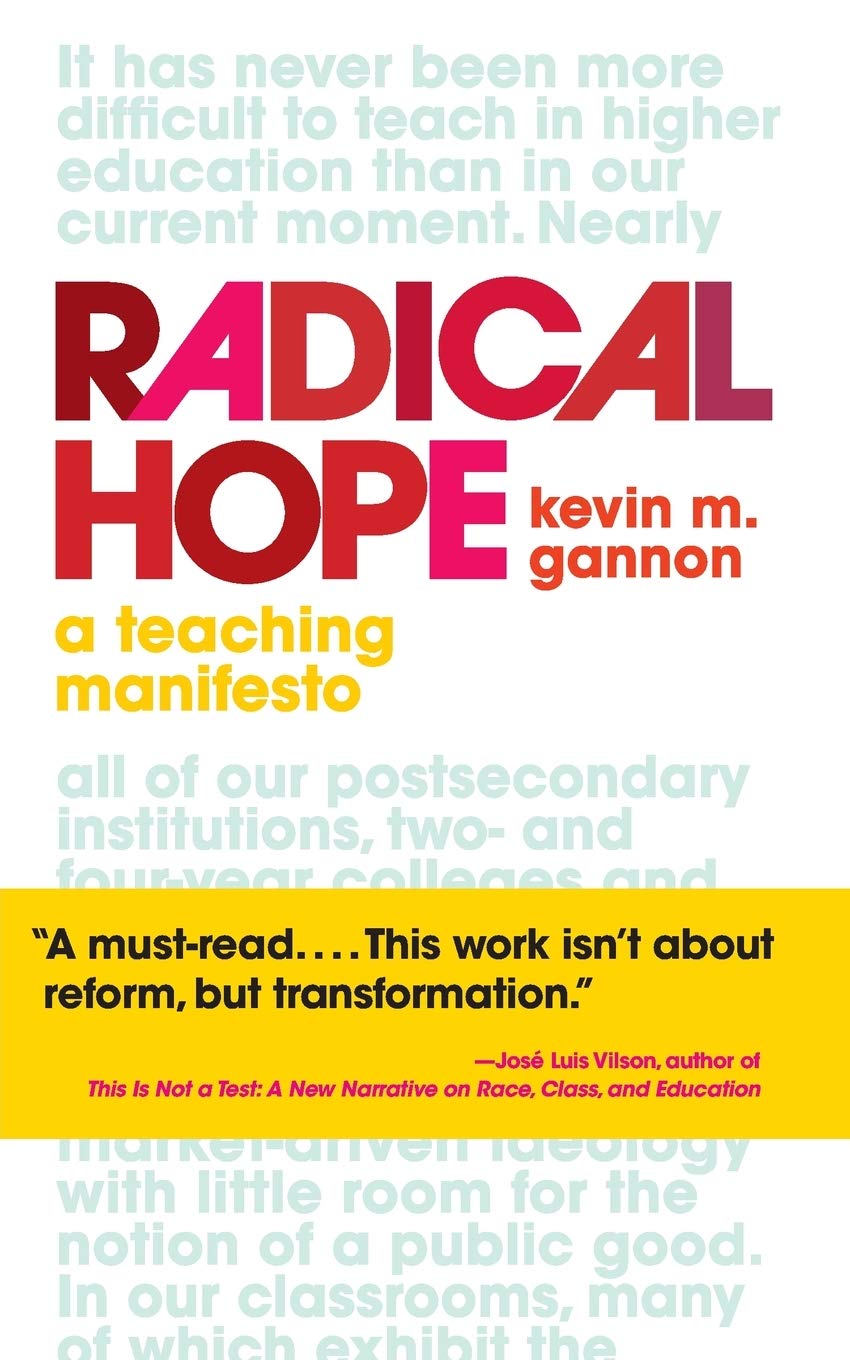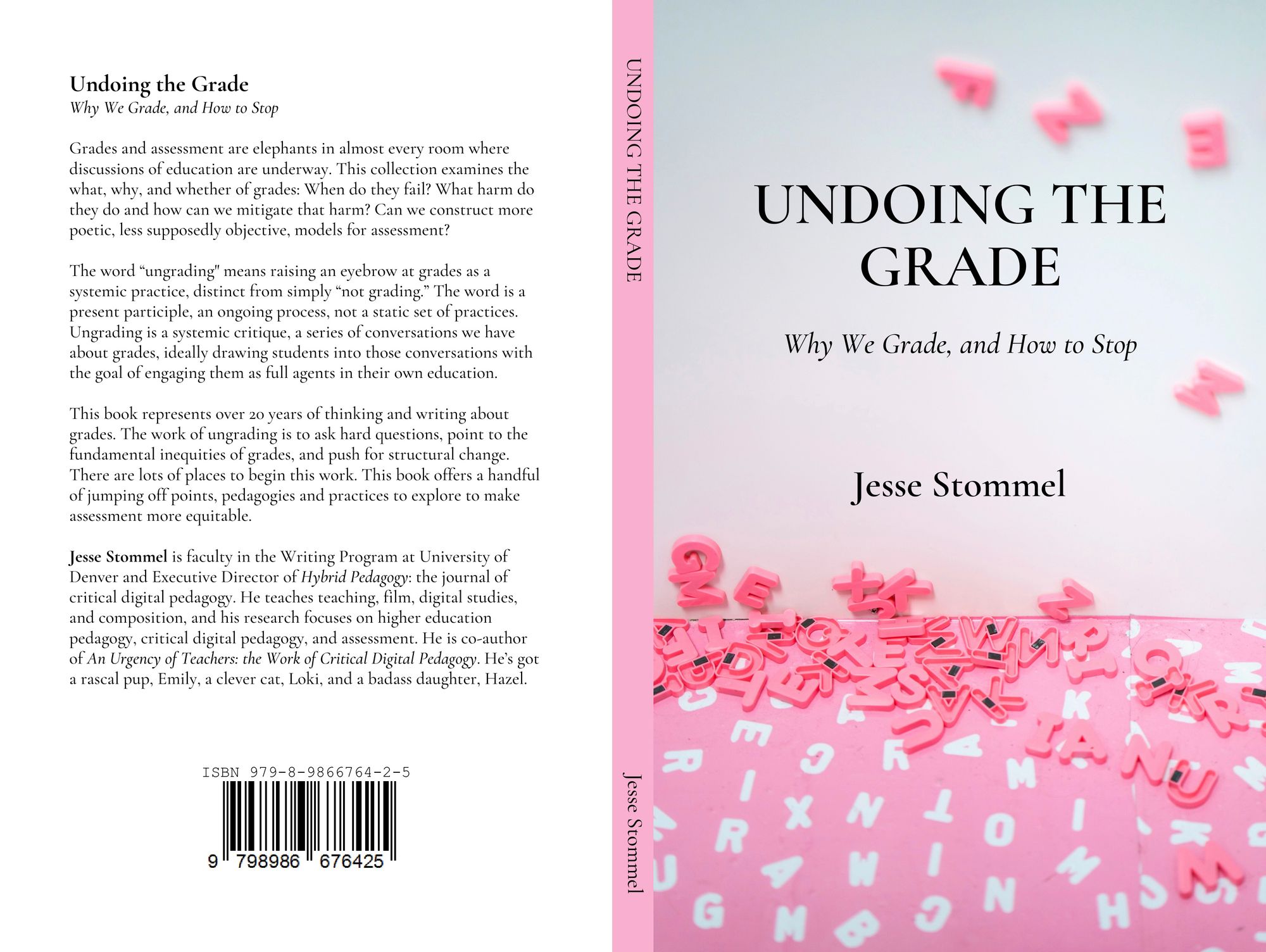Ungrading: A Bibliography
This piece was revised and expanded for my new book, Undoing the Grade: Why We Grade, and How to Stop, available now in paperback and Kindle editions.
What if we didn't grade?
When I first started ungrading 20 years ago, I was inspired by one of my teaching mentors, Marty Bickman, who taught a graduate course called "Theory and the Teaching of Literature." As Marty writes, "The course was built around a beginning undergraduate course that we all taught together. We met for the hour immediately after each undergraduate class to share our perceptions and analyses of it, to relate it to theories we had read or formulated ourselves, [and] to plan the upcoming class in the light of all this." We gave no grades to the undergraduates in our co-taught course, aside from a final grade based on their own self-evaluations. During that same semester, I was also teaching freshman composition, the first course I'd taught as instructor of record. I didn't put grades on student work in that course either. As I wrote in a piece for The Chronicle of Higher Education, from this first semester of my teaching career, I learned "to constantly inspect and wonder at even the smallest of choices we make as teachers."
I recently wrote about the first steps toward ungrading, that the best way to begin is through open conversation with our students about grades. Perhaps, just as important, is that teachers begin by having these conversations more often with each other. There has always been a reflective layer to my teaching, a community of colleagues and co-teachers I turn to for intense discussions about the nature of teaching, both in philosophy and practice. In higher education, this kind of pedagogical community is unfortunately rare. More than 50% of higher education teachers get basically no preparation for the work of teaching. And, among new and continuing faculty (70% of whom are now precariously employed), very few resources are offered to support the development of teaching skills or the building of pedagogical community. Where and when can we safely ask the question, "What if we didn't grade?"
When I talk to other faculty (and students) about grades, I start with a simple set of questions. These kinds of dialogues influence all the work I do:
- Why do we grade? How does it feel to be graded? What do we want grading to do (or not do) in our classes (whether as students or teachers)?
- What do letter grades mean? Do they have any intrinsic meaning, or is the value purely extrinsic? Does assessment mean differently when it is formative rather than summative?
- How do written comments function as (or in relation to) grades? To what extent should teachers be readers of student work (as opposed to evaluators)?
- What is the role of self-assessment and peer-assessment?
- What would happen if we didn’t grade? What would be the benefits? What issues would this raise for students and/or teachers? Would we be forced to rethink our systems for evaluation?
These questions are what hum beneath the writing that is foundational to my thinking about grades. Some of my initial recommendations do get to the nuts and bolts of ungrading and radical assessment, but the focus is more squarely on rethinking the structures in education that short-circuit the work of teaching and learning.
Foundations
- Alfie Kohn, "The Case Against Grades"
- Alfie Kohn, Punished by Rewards: The Trouble with Gold Stars, Incentive Plans, A’s, Praise, and Other Bribes
I struggled to pick just two books or articles to recommend from Alfie Kohn. I'm currently in the middle of reading another excellent book by him, "Unconditional Parenting: Moving From Rewards and Punishment to Love and Reason." Kohn's piece, "The Case Against Grades," is relatively recent, and it captures much of what I appreciate about his work. His writing is clear and straightforward, while also turning our most common presumptions about education on their head. Kohn's central tenets are: "Grades tend to diminish students’ interest in whatever they’re learning"; "Grades create a preference for the easiest possible task"; and "Grades tend to reduce the quality of students’ thinking." His survey of almost 100 years of research is compelling, but his statements of what should be obvious (but isn't) are what makes his work so necessary and vital: "We have to be willing to challenge the conventional wisdom, which in this case means asking not how to improve grades but how to jettison them once and for all."
- Peter Elbow, "Grading Student Writing: Making It Simpler, Fairer, Clearer"
- Peter Elbow, "Ranking, Evaluating, Liking: Sorting Out Three Forms of Judgment"
Peter Elbow is one of the very first pedagogical theorists that I read, and so much of what I learned from him remains central to my approach. Much of his work is about the teaching of writing but is nonetheless extremely relevant to every discipline. Two things I find particularly valuable from Elbow: (1) the concept of minimal grading, about which he writes, "I would rather put my effort into trying to figure out which activities will lead to learning than into trying to measure the exact quality of the final product students turn in"; and (2) the notion that "liking" our students' work could be both pleasurable and also an effective pedagogical strategy. Elbow writes, "Good teachers see what is only potentially good, they get a kick out of mere possibility–and they encourage it."
- Asao Inoue, "A Social Justice Framework for Anti-Racist Writing Assessment: Labor-Based Grading Contracts"
- Cathy Davidson, "Contract Grading and Peer Review"
Asao Inoue and Cathy Davidson's experiments with contract grading are different in many ways but both of them have helped drive much of my thinking about this approach. My concern about contract grading at its surface is that it runs the risk of centering grades more than decentering them. However, Inoue and Davidson show how the approach can be used to raise critical conversations about what grades are, how they make meaning, and how they can be interrogated in the service of marginalized students. Asao Inoue writes that labor-based grading contracts specifically "avoid many of the harmful and racist consequences of conventional grading ecologies by not using the dominant white discourse as the standard for grades." The link above is to a brief handout that masterfully introduces the work he describes at length in his book, Antiracist Writing Assessment Ecologies: Teaching and Assessing Writing for a Socially Just Future.
- Soraya Chemaly, "All Teachers Should Be Trained To Overcome Their Hidden Biases"
This is a relatively short piece, but it's filled with links to research into the problem(s) of bias in education, and also standardized grades. For example, she shares studies that show "teachers spend up to two thirds of their time talking to male students; they also are more likely to interrupt girls but allow boys to talk over them. [...] When teachers ask questions, they direct their gaze towards boys more often, especially when the questions are open-ended." For anyone thinking about ungrading or inclusive pedagogies, I'd recommend opening and reading every single one of Chemaly's links. But I will also warn that some of the studies are more gut-wrenching than others. Grades are not a coincidence. Our systems for assessment reduce students to rows in a spreadsheet, to data points, and strip them of their humanity.
- Jeffrey Schinske and Kimberly Tanner, "Teaching More by Grading Less (or Differently)"
I often turn to this piece for its account of the history of grades in higher education. Every one of their sentences is packed with detail. They couple incisive commentary with refreshing (well-documented) statements like this one, "It would not be surprising to most faculty members that, rather than stimulating an interest in learning, grades primarily enhance students’ motivation to avoid receiving bad grades." In spite of a rather bleak account of what grades have been and are becoming, the piece ends on an optimistic note, "One wonders how much more student learning might occur if instructors’ time spent grading was used in different ways."
Other Points of Entry
Ungrading is not as simple as just removing grades. The word "ungrading" (an active present participle) suggests that we need to do intentional, critical work to dismantle traditional and standardized approaches to assessment. There's a lot to read, certainly, but no neat and tidy point of entry. Rather, each teacher (and each student) must find their own ways into the work. Here are a few more places to start.
My Own Posts and Articles
Here are a few of my most recent posts about grades and ungrading, not in the order they were written, but probably in the order they should be read: Why I Don't Grade; How to Ungrade; Grades are Dehumanizing; Ungrading is No Simple Solution; Ungrading: an FAQ; If bell hooks Made an LMS: Grades, Radical Openness, and Domain of One's Own.
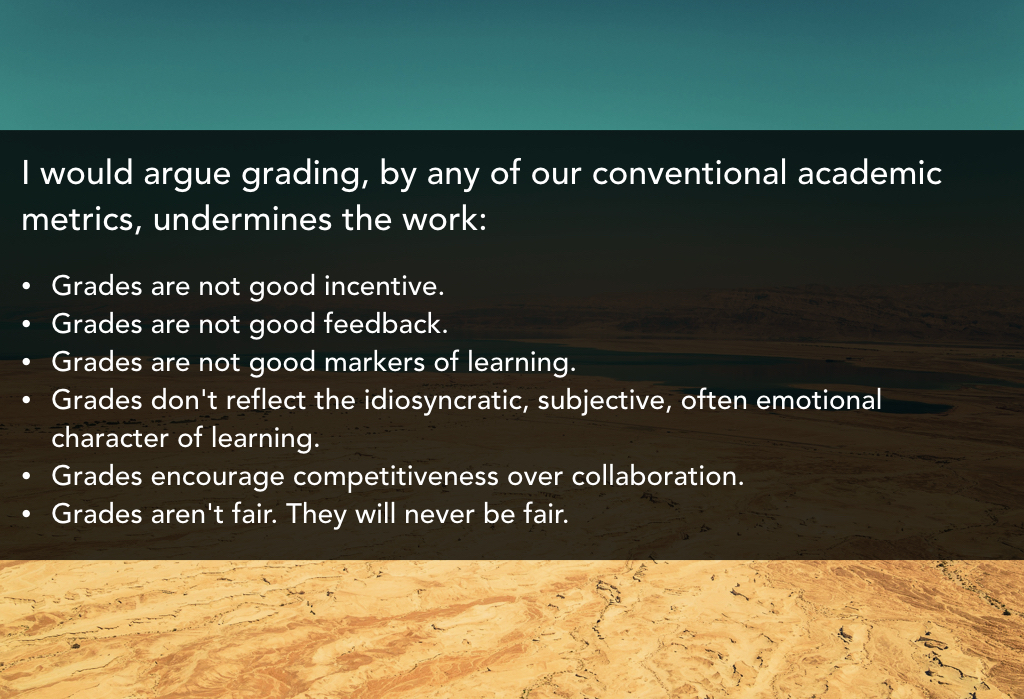




Interviews and Podcasts
Some amazing folks have invited me to talk about grades and ungrading, and I've gather links to those discussions here.
- Beckie Supiano, "Forget Grades and Turnitin. Start Trusting Students."


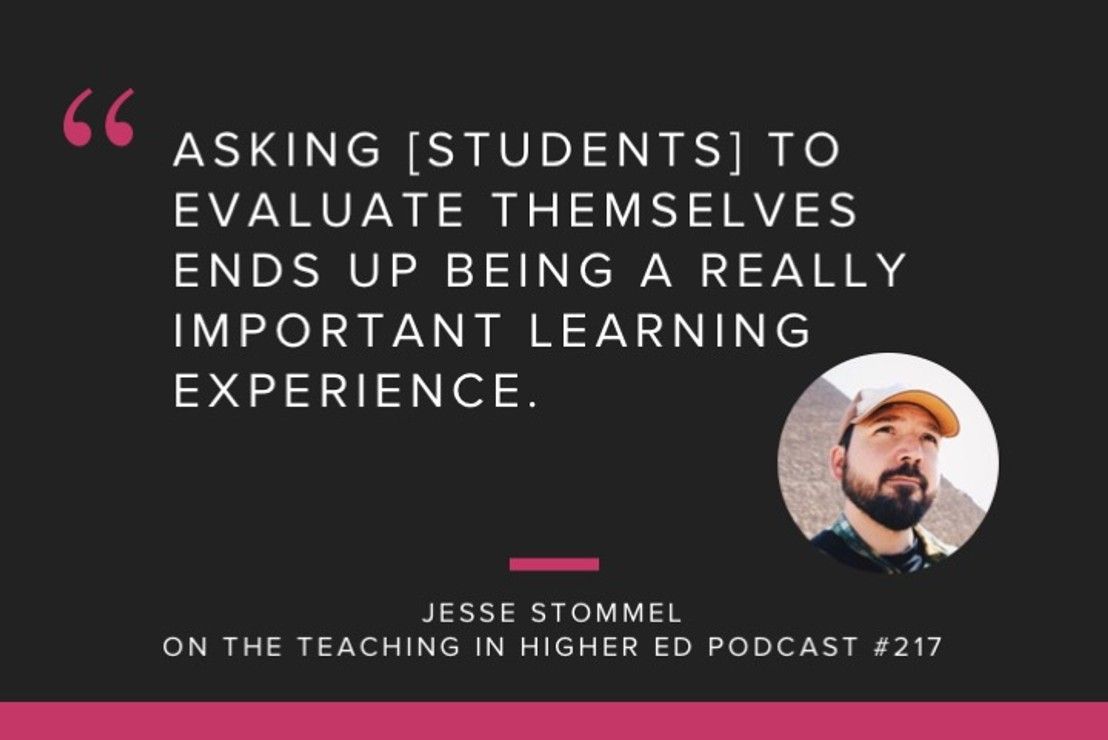

Keynotes, Workshops, and Talks
The video here is from a casual conversation with a group of folks at Digital Pedagogy Lab Toronto. The slides are a variation on a talk I've given in a handful of places, and my workshop notes include links to much of what's here, along with activities and discussions I invite folks to lead on their own campuses. (Everything on my site is licensed CC-BY-NC, so feel free to borrow at will, or bring me for a visit).
Twitter Threads
Just a couple of many #ungrading Twitter threads worth sifting through, I especially appreciate the replies to this first one, featuring the voices of students talking about their own experiences with grades and ungrading.
For students, how does it feel to be graded? What effect do grades have on your learning? If you’ve been in a class that approaches grading differently or one without grades (like mine), how did that feel/work? RT to invite more folks to join the conversation. #colabungrading https://t.co/yuzZux7Kuj
— Jesse Stommel (@Jessifer) December 14, 2019
As a teacher in higher education, if you are required to grade, how much preparation did you receive in assessment strategies and the what/why/how of grading?
— Jesse Stommel (@Jessifer) August 8, 2019
Answer, retweet, reply with more thoughts. #digped #realcollege
The concept of grade inflation is nonsense.
— Jesse Stommel (@Jessifer) March 3, 2020
News
As much as folks argue ungrading isn't new (indeed, it isn't), I've been glad to see major educational news outlets increasingly interrogating the topic with the nuance it deserves.
- Beckie Supiano, The Chronicle of Higher Education, "Grades Can Hinder Learning. What Should Professors Use Instead?"
- Claire L. Jarvis, "Chemistry educators try ‘ungrading’ techniques to help students learn"




More Books, Articles, and Blog Posts
- Sean Michael Morris, "When We Talk about Grades, We are Talking about People"
- Alfie Kohn, "From Degrading to De-grading"
- Starr Sackstein, Hacking Assessment: 10 Ways to Go Gradeless in a Traditional Grades School
- Heather Mitchell-Buck, "Adventures In Ungrading"
- Thomas J. Tobin, "In the Halls of the King Under the Mountain (of Grading)"
- Clarissa Sorensen-Unruh, "Ungrading: A Series"
- Clarissa Sorensen-Unruh, "Ungrading: What is it and why should we use it?"
- Susan D. Blum, "Ungrading"
- Marc Kissel, "Going Gradeless"
- Arthur Chiaravalli, "Teachers Going Gradeless: Toward a Future of Growth Not Grades"
- Laura Gibbs, "(Un)Grading: It Can Be Done in College"
- John Warner, "Continuing Adventures in Ungrading"
- Kevin Gannon, "How to Escape Grading Jail"
- Steve Greenlaw, "Adventures in Ungrading"
- "Learning is Not a Mechanism," along with a handful of other chapters featured in my 2018 book with Sean Michael Morris, An Urgency of Teachers: The Work of Critical Digital Pedagogy
Other Lists of Stuff to Read
I've barely scratched the surface in this post, so if you're looking for even more to read, here's a few excellent resources.
- Jessamyn Neuhaus, "Bibliography: Non-Traditional Grading and 'Ungrading'"
- Laura Gibbs, "Ungrading for More/Better Feedback"
- PSU Open CoLab, "Ungrading Resources"
One More Thing...
As I've written previously, "Ungrading works best when it's part of a more holistic pedagogical practice–when we also rethink due dates, policies, syllabi, and assignments–when we ask students to do work that has intrinsic value and authentic audiences." Asking students to be directly involved in the grading process and in helping dismantle grades as a system is an extension of my core teaching philosophy, which is grounded in the work of critical pedagogy. My approach to ungrading has arisen as much from that core philosophy as it has from stuff I've read about grades and assessment. So, I'll end by recommending two incredible books, one of the first pedagogy books I read, and the book I'm reading right now. Neither of these books is about grades specifically (nor really has grading as a focus at all), but they are exactly about core philosophies, and thus a wonderful place to begin.
- bell hooks, Teaching to Transgress
“The classroom remains the most radical space of possibility in the academy.”
- Kevin Gannon, Radical Hope: a Teaching Manifesto
"Pedagogy cannot be neutral. [...] Neutrality is a luxury of the comfortable; in these uncomfortable times, our students and our academic communities need more from us."
